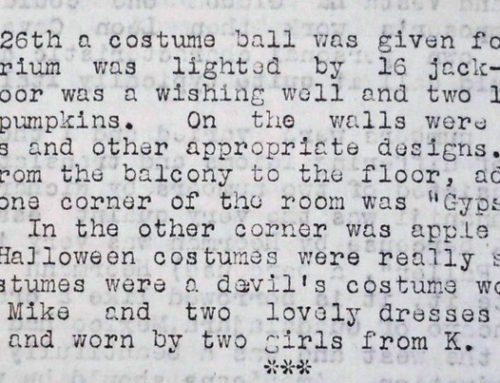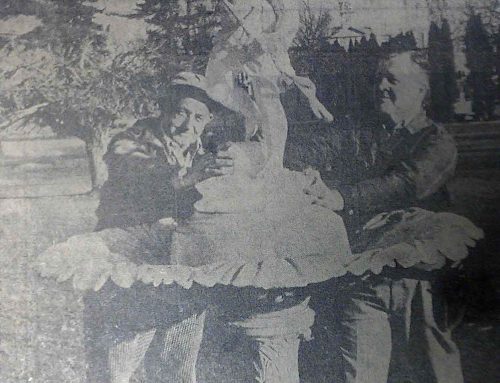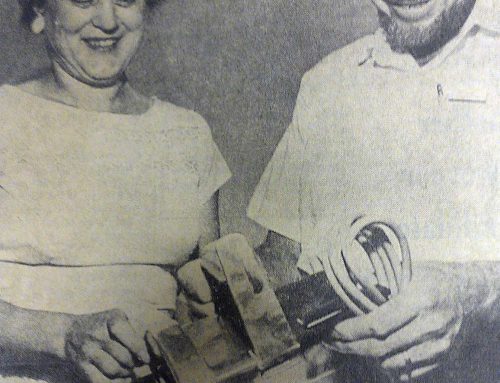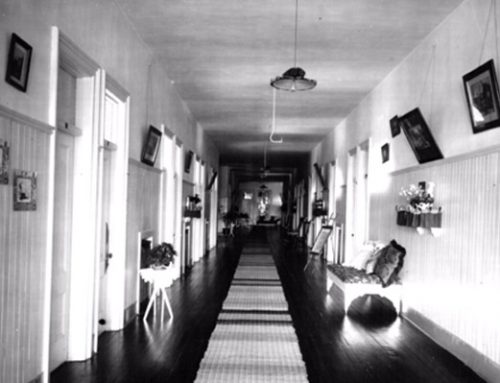The following is an account published in the Sunday Oregonian June 14, 1936. The piece was co-written by a staff reporter and a patient at the Oregon State Hospital. It offers a unique first hand perspective of hospital life.
An Explanation
“They’ll put you out at the end of Center street if you don’t watch out,” Salem people say when somebody is acting in a peculiar fashion. “They’ll put you out in the bughouse with the rest of the nuts.”
For at the end of Center street, one of Salem’s broad thoroughfares is the Oregon state hospital. “For the insane” they used to add to that title, but they don’t anymore. The staff of doctors who supervise Oregon’s institution for the care, treatment and often cure of the mentally ill don’t like the word insane, just as they dislike having their hospital called “a bughouse” and their patients “nuts.”
Often as the people of Salem refer to the big hospital at the end of Center street, most of them know surprisingly little about it. Few people except professional psychiatrists and students of abnormal psychology know much about insanity and its causes and cures. Since the dark ages when the insane were believed possessed of the devil insanity has been mixed in the public mind with witch’s cauldrons, black magic and devil-lore.
Even for those who have visited Oregon’s hospital for the insane, either through curiosity or a sincere desire to learn about insanity, it is impossible to get a comprehensive idea of the institution from a casual visit. It would be necessary to stay there for days to learn all about it. This is the story of a person who has stayed there for days and for weeks and for months. It is the story told by a patient at the Oregon state hospital.
Some Patients Have Insight
Twenty types of insanity are standardly classified by the 614 state hospitals in the United States. Sufferers of but few of these types have sufficient “insight,” as the psychiatrist calls it, to understand why they are in a mental hospital or to give a logical and coherent story of their life there. Many can and will give very interesting but unreliable stories, crammed with their own delusions.
The most common mental ailment is dementia praecox or schizophrenia, a deterioration of mentality. About 26 percent of all first admissions are of this type. Next, in frequency is the manic-depressive psychoses, one in which the patient is either highly elated or deeply depressed, alternating between the two extremes. Sixteen percent of first admissions are of the manic depressive type. Various senile psychoses account for 12 percent of admissions and general paresis, enfeeblement of the mentality as a result of syphilis, is the cause of 19 percent of first admissions. Few of these cases have “insight.”
Some mentally ill persons do have “insight,” they know they are ill and can talk logically about their illness. They are rare. Of the various types of psychoses it is probably the alcoholic that has the best “insight.” Unless he is far gone, the alcoholic’s trouble is mostly lack of self-control. After the forced abstinence provided by an institution for the mentally ailing the alcoholic patient can give a clear, sensible story of his own case, other cases and the institution as a whole.
The patient telling the following story is one of the rarer types that have “insight.” He has been well educated. His ordinary observations are thoroughly normal; and it will be observed, later, that his sense of humor, fortunately for himself, has not been impaired by his illness. For the purposes of this narrative the patient has been given the assumed name, “James R. Robblett.”
Certain circumstances in Mr. Robblett’s case have been altered to avoid identifying him as the narrator. His reactions have been checked with two other patients who also have “insight,” and some of their anecdotes have been incorporated with Mr. Robblett’s permission in his narrative.
Statements in italics were prepared with the assistance of the state hospital physicians. The collaborator in the narrative, Paul Hauser, is an Oregonian staff correspondent living in Salem. The articles have been checked and approved by the state hospital staff.
By James R. Robblett as told to Paul Hauser
HERE I am in an insane asylum, the place some people refer to as the booby hatch and the bughouse. The surprising thing is that I don’t feel too badly about it. I came here not too willingly and, though I look forward hopefully to the day when I can walk forth again entirely free, it isn’t as bad as it’s cracked up to be. It’s no bed of roses, either.
I probably needed to come here. I was in a hopeless, discouraged state of mind. It was a temporary insanity, I suppose, brought on by several factors. I had been working too hard, doing brain work and not getting sufficient exercise. I had lived in a small room, cramped and low-ceilinged. I imagine I had a case of claustrophobia, the maddening feeling of being walled in on all sides, to help the breakdown along. If I could have left town for a week or so I might have recovered, but I was in an intensely nervous condition and my relatives and friends didn’t know how to help me much.
Finally it was decided that I should be sent to the state hospital. My relatives, knowing no other course, arranged a commitment.
Types of Commitment Explained
There are three types of commitments to the Oregon state hospital. One is a direct order from the circuit judge, the next is the usual county court commitment and the last the voluntary type of commitment. About 25 patients are received annually under the voluntary commitment law and the procedure in this type is for the patient to present himself or herself at the institution, generally in the company of relatives or friends or the family physician. The superintendent of the state hospital is the final judge as to whether or not the case is proper to be admitted under this law.
If accepted by the superintendent or the medical staff, the patient is entitled to 30 days for the purpose of observation, care and treatment, at the end of which time he is released. However, should any of these cases be considered violent or bad risks upon society, the relatives or friends are notified of this fact and they in turn, bring about the usual county court commitment.
Again, in the event the patient is considered harmless and becomes dissatisfied at an early date with the treatment accorded him in the institution, he is immediately dismissed.
The hospital authorities have considerable difficulty at times in refusing admittances of cases who are obviously chronic or violent or those who cannot be adequately treated in so short a period of time. This difficulty just referred to is generally brought about by insistent relatives who wish to avoid the so-called “stigma” of having a loved one decreed legally insane and placed in the state hospital through the usual procedure.
We set out on a bright morning in a large car. I was not frightened, for I know where I was going and know that I would be treated as well or better than in an ordinary hospital. Before we left they stopped to pick up another patient, an old lady. With her was a young woman.
Arrived Early in Afternoon
As we started out to town I fancied I heard the young woman in the back seat sobbing softly, and wondered if she knows the tragedy of my case, my broken elderly parents left without even the meager support I had afforded. There is hardly anything as tragic as insanity. Yet life is full of tragedies and still goes on somehow.
I thought of little on the trip to Salem. I remember having a pang of regret as we passed through a little town that was the scene of my latest labors. Most of the way I rested and even slept some. It’s as almost good to get away.
When we arrived here at the state hospital it was early in the afternoon. The sun was shining and the grounds looked very green and lovely.
The Oregon State hospital is located at the end of an attractive park of rolling lawns, stately trees and well-kept flower beds.
The first impression o the three story main building, the original parts were erected in 1883, is one of immensity. To a person walking down Center street, the side of the building facing that way, with its barred windows, the building seems to stretch for blocks. That is only one wing of a building that houses most of the institutions’ approximately 2400 patients. The main building also houses the administration offices.
Across Center street is a modern treatment and psychopathic hospital, housing 160 patients in the receiving and hospital wards. More of the plant stretches out behind the main building, the central heating plant, a laundry, greenhouses and a separate building for tubercular and diabetic patients are located. Further back, another building is being constructed. It will be another hospital building to relieve the overcrowding in the other two hospitals.
Puzzled in Identifying Patients
We pulled up to the door of the receiving ward. I got out and carried my own bag in. The first person I saw was a man in a white apron. I thought he was an attendant and asked him a question. I later learned when we were in the same ward together that he was also a patient.
That is one of the most confusing things about life here. It is difficult for confused newcomers to distinguish between the attendants and the patients. Later I learned that attendants all wear white-starched coats. Other than that, there is no particular uniform for either patients or attendants. Usually the attendants are a little better dressed than the patients.
Like most patients when they first arrive, I was ill at ease. One of the patients summed up the condition of most of the new arrivals as “confused and frightened.”
The man in the white apron took my grip and led me into the doctor’s office. The first thing they told me to do there was to empty my pockets. I did, leaving my money and everything else I had in my clothes on the table there. I suppose they’re keeping it for me. I remember I forgot 90 cents that I had in my watch pocket and found a few minutes after when I stripped for a bath.
When patients are first admitted they are given a bath and placed in bed to await the attending physician’s visit. It is his duty to get acquainted and being a mental examination, which may or may not require several contacts in order to arrive at a definite conclusion and a possible diagnosis.
This depends entirely upon the individual. If a patient arrives in a belligerent and resistive frame of mind and also is morbidly suspicious of his new surroundings, then it is a definite mistake upon the part of the examining physician to crowd his mental investigation. This process only deepens the inmate’s suspicion as he trusts no one, and causes fresh resentment. He may feel that the doctor is prying into his private affairs, and at once the doctor is held to be in league with the patient’s imagined enemies.
Fainted when given blood test
They gave me the usual medical tests that first day as they do every entering patient. I remember I fainted when they gave me a blood test. I was weak and tired and they had me stand up for the test. When the nurse jammed the needle in my arm I fainted dead away. It was just like the lights had gone out suddenly. I had never fainted before in my life.
Then there is another test to determine whether the patient is syphilitic, as many are here. Patients not too far gone with syphilis are given the malarial treatment. The malaria germs are injected into the patient’s blood, giving him a malarial fever that kills the spirochetes, the parasitical causes of syphilis. Right now, four or five patients on the ward are in bed with malaria.
Of course, I was given an X-ray and also a fluoroscopic examination. My heart and lungs were all right.
After all that was over, the attendant asked me if I wanted to go to bed. It was still mid-afternoon, but I decided to rest.
They put me in a corner room in ward C, the receiving ward. Every patient that comes to the hospital goes first to Ward C. It is an observation ward and, according to hospital gossip, the second best ward in the institution. Like this one, ward D, is light and airy, almost like a well-regulated but not too fancy hotel.
In ward C you are apt to see the whole gamut of insanity. Some of the patients there are violently insane and even dangerous, but they are locked in. Some of them scream, but you soon become accustomed to that. Some talk incessantly, often choosing nighttime for their loudest tirades.
The rules are less strict in ward C than in any other ward. Because it is an observation ward, the patient is allowed a good deal of rope to find himself.
I went to bed. My room was small, but very clean and tidy; very much like a room in any hospital except that the windows were barred.
Given more freedom in Ward C.
Lying in bed, I was quite despondent. I had little hope and was greatly discouraged. I was bitterly unhappy that this should have happened. I suppose I was accusing myself, which may have been the major element in my condition. It was a case of an over refined conscientiousness. I was virtue overdone to such an extent that it had become a vice. I had worked so darn hard that I had made an awful mess of things.
The first incident I remember was an old man, a regular patient in the ward, coming in and fussing about the bed. He was tucking the sheet in and smoothing the covers. HE was trying to be helpful. Incidentally, most of the patients are very kind to each other and help one another out in many ways. There is some bickering, of course, as are there always in when men congregate in confinement. But I wanted then to be left alone and the old man’s helpfulness irritated me. I said nothing and he went away.
Then two more old men came in and looked at me, just staring and saying nothing. Presently I went to sleep.
Felt restrained at First Meal
I got up in time for dinner. I went out and down in the parlor. I was rather frightened and felt very much like a stranger in a strange place, which I was of course.
My first meal in the asylum was quite strange. I didn’t know anybody and kept very quiet during the meal. The dining room in ward C is much like a restaurant or hotel dining room. We sit four at a table and are served by other patients who are on dinging room duty. I have worked there.
Some time during that first day I had a conference with the doctor on the ward. I didn’t behave very well and didn’t answer his questions, but rambled on about whatever came into my head.
After I had finished the conference with the doctor I went back to my room. Almost immediately a fine looking young fellow, also a patient, popped in the door. He was quite rational and began berating me for the way I had answered the doctor’s questions. Apparently he had overheard this conference.
He gave me some very good advice. He said, “You do just what the doctor says if you want to get out of here.”
When a patient is first admitted to the institution and effort is made upon the part of the doctor to get on friendly terms with the inmate and, if it is possible, to gain his confidence and obtain his cooperation. This will go a long ways toward realizing the patient’s complexes. On the other hand, if the patient is disturbed to the degree that he is unable to cooperate, or, on account of certain suspicions, he refuses to do so, little can be done in the way of care until such a happy understanding is obtained.
The patient who advised me in such an irritated fashion was just trying to be friendly and we later became great friends. He suffered from the delusion that he was about to die of pneumonia. He was a strong, healthy man and hadn’t a sign of illness on him, but every once in a while he would insist on going to bed, where he prepared to die of pneumonia. Sometimes it was what he called “quick TM” that was going to be his death. One day he hung himself in a closed with a leather strap. He must have wanted to die very badly, for he had to hold his feet off the floor until he strangled to death.
I went to bed that night with a few shivers. I had spent my first day in an insane asylum and I was sure I didn’t like it. Everybody looked all right, but I had been there long enough to know that most of them were crazy as loons. I lay in bed thinking it over. I was frightened and wondering about what would happen the next day, when I would get out, if ever.
Presently I went to sleep. I was awakened by piercing shrieks and screams that set my teeth on edge. I heard attendants running down hall and knew that some patient was having an attack. I sat up in bed. I was sweating and I was plain scared.
Continued next Sunday.





